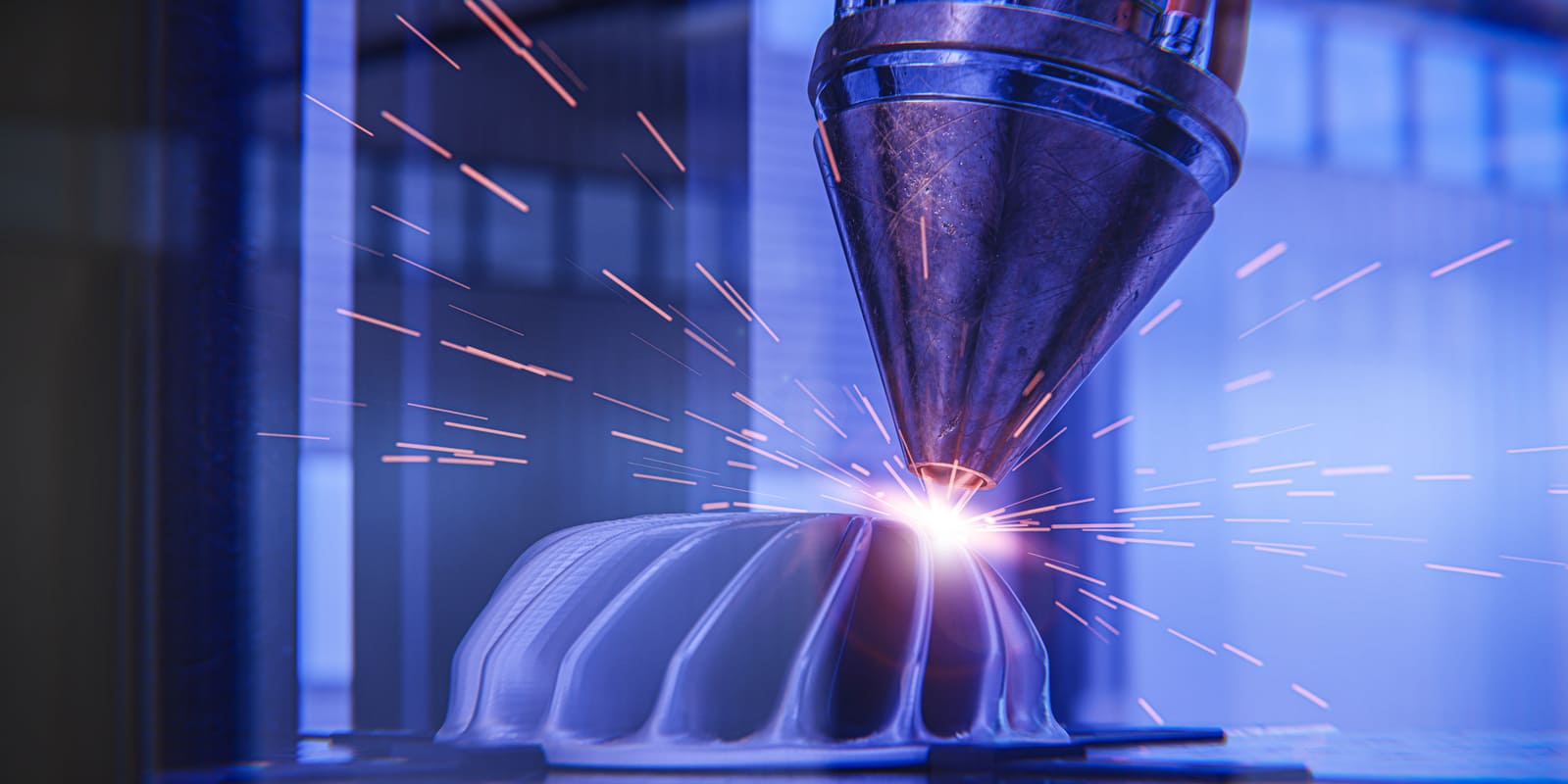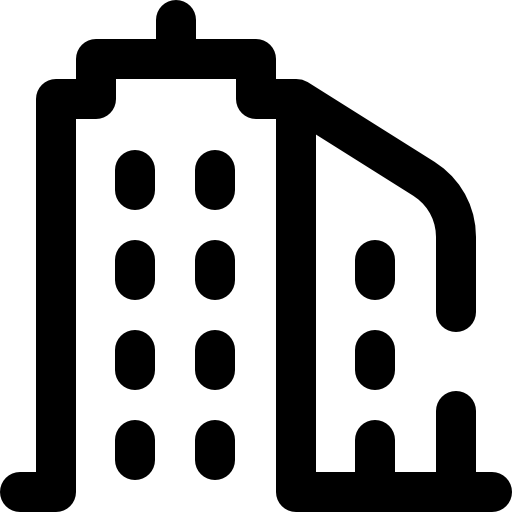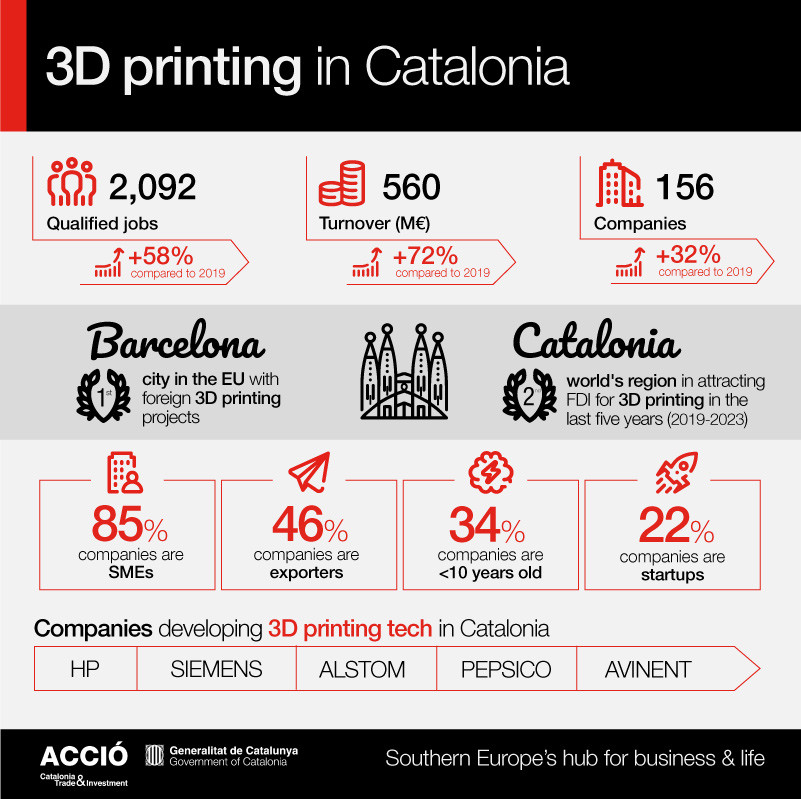“The HP Barcelona center continues to expand and solidify its position as a benchmark, both nationally and internationally”
Ramon Pastor, Global Head and General Manager at HP
The 3D Printing sector concentrates the largest number of companies in Catalonia in parts manufacturing, followed by those specializing in engineering, consulting, certification services, distribution, and materials development.

The 3D printing technology groups together 156 companies in Catalonia (32% more than in 2019), generating a turnover of 560 million euros (an increase of 72%) and employing 2,092 people (58% more). This is the main data arising from the update of the study “3D printing in Catalonia”, prepared by Catalonia Trade & Investment.
The 3D printing field includes all those companies offering a technology that allows volumetric objects from digital models to be made. These are flexible products that can be customized. It is a sector that generates added value to the industrial ecosystem, whether in manufacturing parts or streamlining product design and development processes. You can search our database to find Catalan suppliers in the 3D printing sector.
The 3D printing sector concentrates the largest number of companies in Catalonia in parts manufacturing (30.8% of the total), followed by those specializing in engineering, consulting, and certification services (13.5%), distribution (12.8%), and materials development (10.9%).
The 3D printing market is experiencing significant growth, with 34% of companies less than ten years old, 85% of which are SMEs. In terms of turnover, half of the companies earn more than one million euros per year, and 30% generate a turnover of more than 10 million euros per year. Moreover, 46% of companies regularly export their products.
Over the last five years, Catalonia has been the second region in the world in terms of attracting foreign investment linked to 3D printing, with 87.5 million euros from 8 projects that have generated 423 new jobs. In fact, Barcelona is Europe’s leading city in terms of the presence of projects from international companies. Moreover, in 2023, Catalonia concentrated 100% of foreign investment in this sector in the whole of Spain.
Multinationals such as HP, Siemens, Alstom, Pepsico or Avinent have opted for Catalonia recently to establish their hubs or centers for the development of 3D printing technology.
“The HP Barcelona center continues to expand and solidify its position as a benchmark, both nationally and internationally”
Ramon Pastor, Global Head and General Manager at HP


156 companies

€560M in turnover

2,092 employees
Catalonia has a dense network of technology and research centers focused on improving 3D printing, an ecosystem aimed at boosting development projects. Initiatives such as the XaRFA group, a compendium of 28 research groups coordinated by the CIM UPC; the IAM3DHUB center; the 3D Incubator: the Digital Innovation Hub of Catalonia (DIH4CAT); or the Think In 3D of Mataró, among others, stand out.
In addition, there are units and centers that are dedicated exclusively to developing 3D technology in the field of healthcare, such as 3D Printing at the Hospital de Sant Joan de Déu, or the Institute for Research and Innovation of Parc Taulí in Sabadell.
3D printing is being applied to various areas of the economy, generating high-added value and providing solutions in several ambits. The first of these is sustainability, since the manufacture of objects using 3D printing is made from materials that generate less waste and environmental impact, are often recyclable, and allow the useful life of the product to be extended. This trend is aligned with global needs and with the 2030 agenda of Sustainable Development Goals (SDGs) promoted by the United Nations.
There is also a clear trend in the health sector in terms of the design, manufacture, and use of bioprinting. This technique allows the recreation of organic tissues similar to those of the human body, which is increasingly present in the field of regenerative medicine (implants, prostheses) and offers multiple medical solutions and the possibility to treat diseases and injuries of all kinds. Furthermore, there is an increase in the number of companies manufacturing anatomical models that recreate human bodies for pre-surgical sessions, others that design surgical guides for the correct placement of 3D material in a body, or those that work with customized drugs for each patient.
Another trend is the deployment of artificial intelligence, which opens up possibilities to innovate and enhance 3D printing in the quality control of products, in the optimization of production both in the supply chain and in the efficiency of the manufacturing process. Furthermore, it also helps in the creation and design for those users without sufficient technical and computer skills, who will be able to customize their products without losing functionality.
The 3D printing in Catalonia report also talks about the importance of 3D printing for resilience in value chains, a fact that has been accentuated in recent years after the pandemic and by the scarcity of components from foreign countries. In this sense, the sector under study allows reindustrialization, manufacturing products without the need to import them, generating new high-quality jobs and added value, as well as promoting innovation.
Finally, the document shows the growth of 4D printing, a segment that is gaining presence in sectors such as health, automotive and aerospace engineering, fashion, or packaging.
According to data from the European Patent Office and Precedence Research detailed in the study, the sector's global turnover is expected to be 24,000 million euros in 2024, with a potential increase of 19% year over year, reaching almost 70,000 million euros in 2030.

Get our free report on 3D Printing in Catalonia and its applications in the industry.
15 Jan 2026
What’s Next for Global Tech Hubs in Barcelona-Catalonia?
23 May 2025
Investing in Digital Health: Why Barcelona-Catalonia is on the Global Map
14 Mar 2025
One day with Dai Nippon Printing at MWC Barcelona
20 Feb 2025
Success Case: Tech giant Oracle expands in Barcelona with a new European Health Hub